Most Common Korean Words and Phrases You Should Know
If you’re an avid Korean drama series viewer, you must be familiar with the most common Korean words and phrases from K-dramas. Have you ever wondered why they don’t call each other’s names often? I’m sure you’ve heard them call each other oppa, sunbae, or unnie instead if you’ve seen famous and some of the best K-drama series like Doctor Stranger, Penthouse, Jirisan, Startup, Hometown Cha-cha-cha, and W: Two Worlds Apart. However, what do these most common Korean words and phrases from K-dramas and Korean movies mean, and how can you use them in everyday life?
In Korean Culture, Your Age Matters
It’s essential to learn the translation of the words and the context in which they are used. In Korea, age and sex matters a lot when talking to people. Depending on whom the speaker is talking to, the tone and level of formality are crucial—just like in any other language.
When a sentence ends in “-요” or “-yo”, it is mostly in polite form. If you want the sentence to be more casual, you can just drop the “-요” or “-yo” to make the tone intimate. Speaking in 반말 (banmal) within your peers shows familiarity and close relationship.
Common Korean Words and Phrases from K-dramas
For language learners, the easiest way to familiarize themselves with the language is through imitation. Mimicking how a native speaker enunciates or delivers a line helps understand the context of the words or phrases spoken. This is important in the Korean language because it relies heavily on context. So, if you are interested in learning Korean, learning these common Korean drama phrases and words are helpful, especially when you binge-watch Korean dramas and movies. You’re entertained while learning at the same time. Here is a list of Korean to English translations of common words and phrases from K-dramas that you can use!
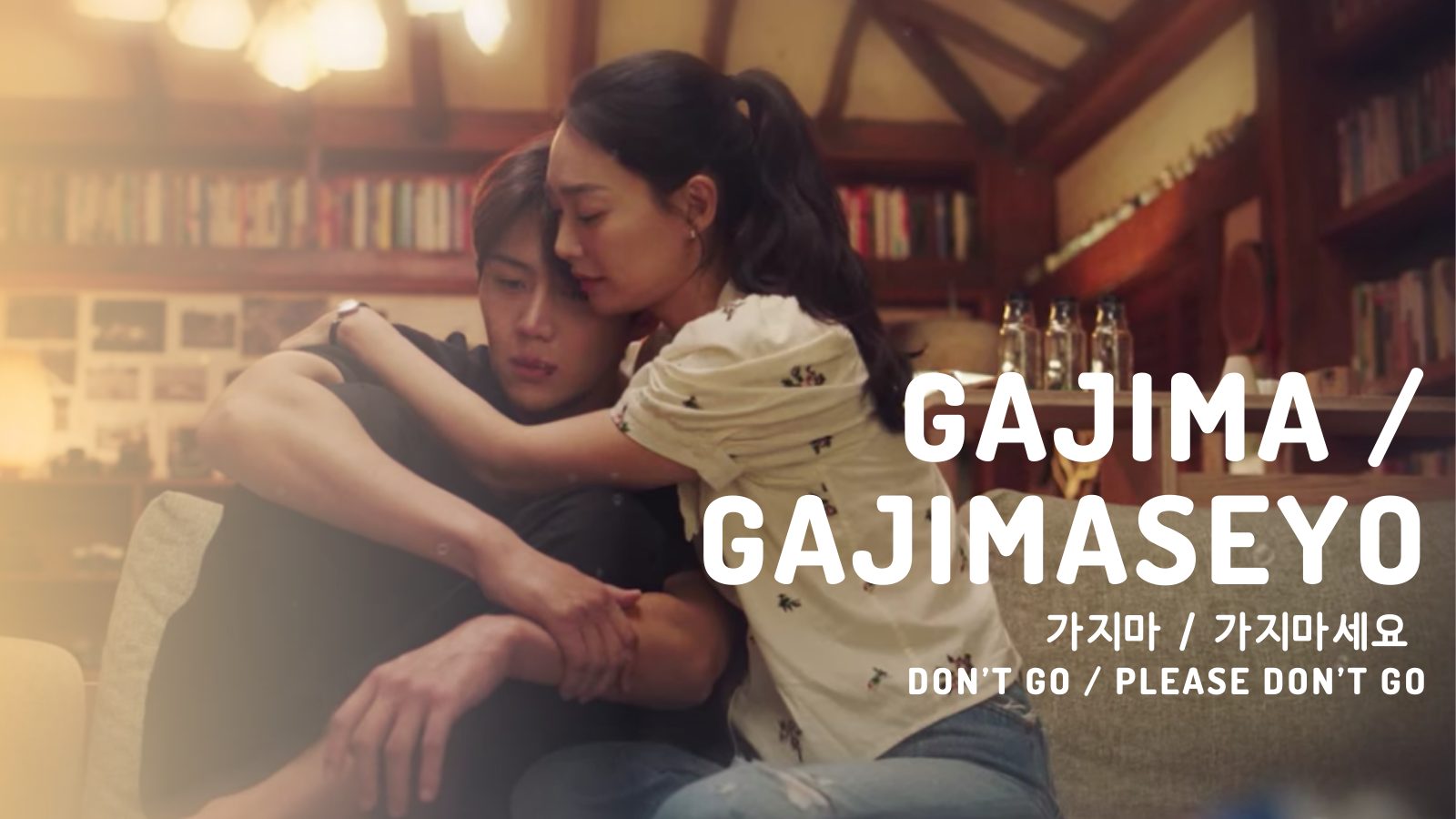
가지마 / 가지마세요
Gajima / Gajima Seyo
Don’t go / Please don’t go
You’ve heard this in almost every K-drama you’ve seen so far. One classic example is a tear jerking scene from Hometown Cha-cha-cha, when Hong Du-Sik (Kim Seonho) said those words to Yoon Hye-Jin (Shin Min-a). As the main lead is left behind, he or she exclaims, “가지마!” Gajima is considered a casual form of the more formal one, gajimaseyo. If you are speaking to a friend, you can use gajima. However, if you want a more polite way of saying “don’t go,” gajimaseyo is the word.

사랑해(요)
Saranghae(yo)
I love you
Of course, the famous “saranghae.” You’ve heard Ji Eun-Tak say this multiple times to Gong Yoo’s character Kim Shin throughout the Goblin series. You can say this in different ways as well. Saranghae is the casual way of saying it, while saranghaeyo is the more polite way. If you want to say it formally, you should use 사랑합니다 or saranghamnida. For instance, if you’re going to say I love you to your partner, you can use saranghae to show intimacy and closeness.
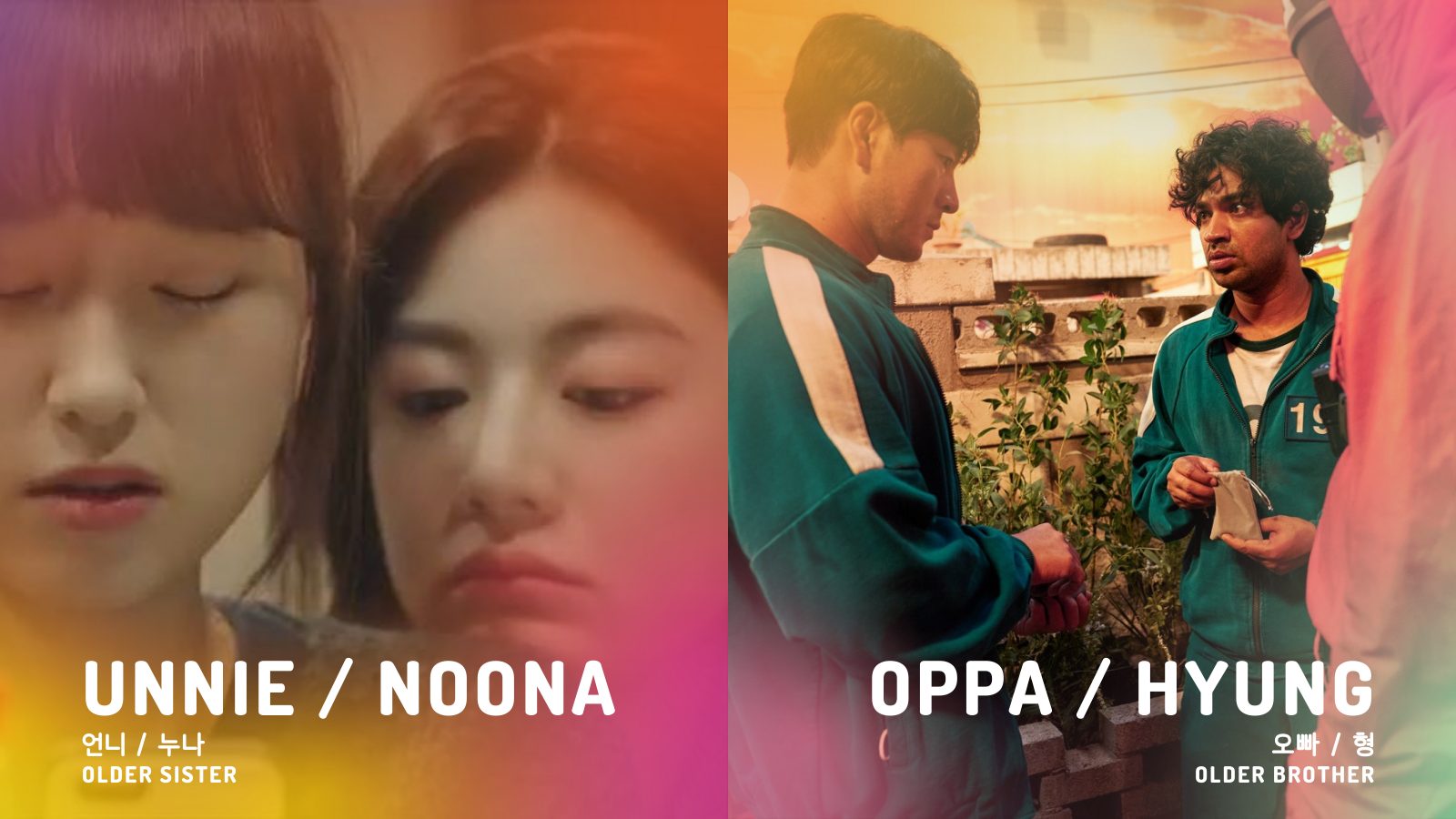
오빠 / 형
Oppa / Hyung
Older Brother
언니 / 누나
Unnie / Noona
Older Sister
In Korea, calling someone oppa, hyung, unnie, or noona (older brother/sister) is a sign of familiarity and closeness. The terms do not only signify blood relation but also can be used towards friends who are older than you. If you are talking to an older brother, you can use oppa or hyung, depending on your sexuality. If you are a female, you call them oppa, and if you are a male, you call them hyung. The same goes for your older sister. For females, you call them unnie, and for males, you call them noona. In Squid Games, during a touching scene between Ali and Cho Sangwoo, Sangwoo told Ali to call him hyung to denote closeness and trust.
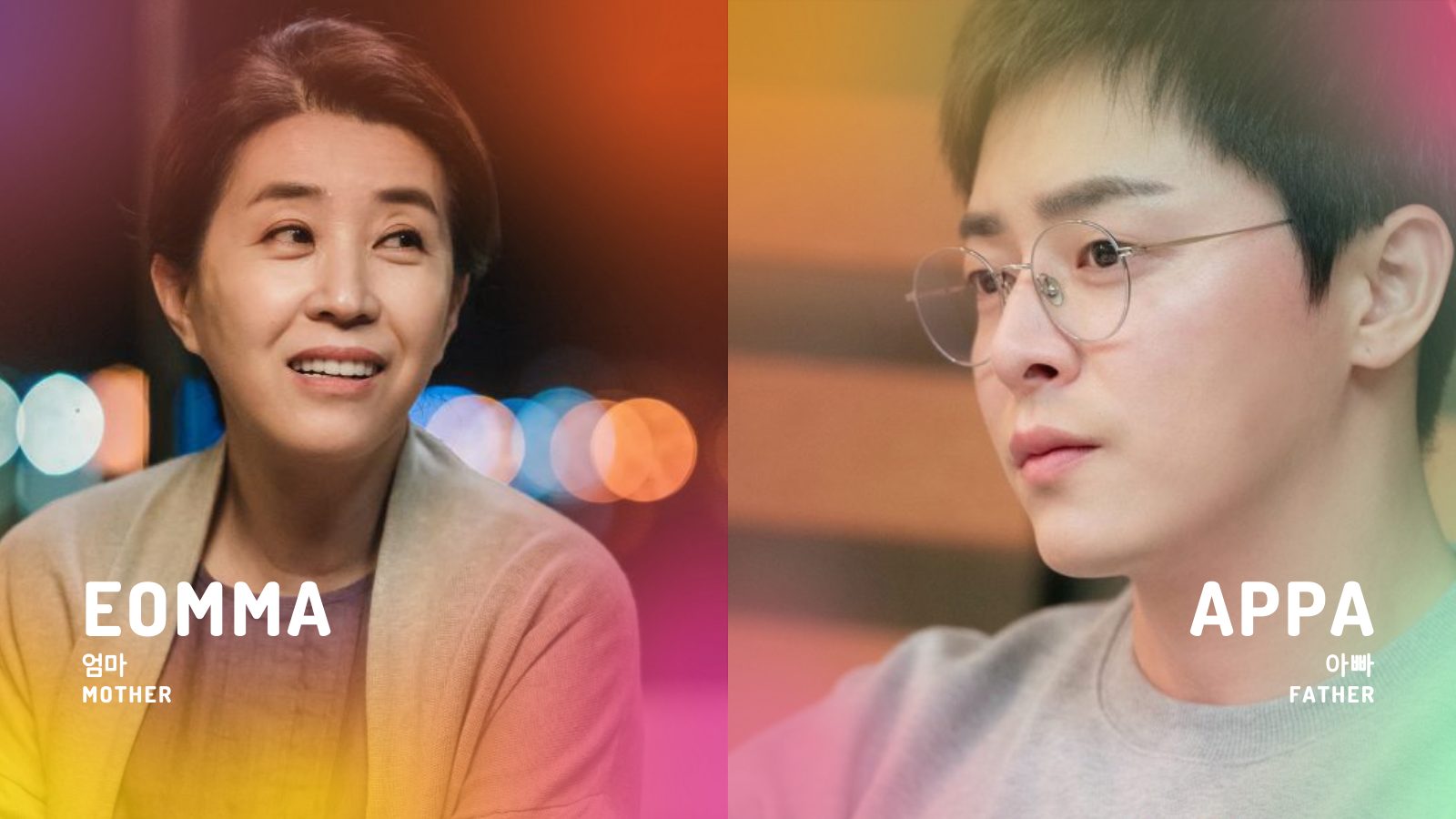
엄마 , 아빠
Eomma, Appa
Mother, Father
Time to change your contact information? Call your mom and dad as eomma and appa to change things up. If your parents love watching K-dramas with you, they’ll get the reference. You might be wondering what’s the difference between eomma and eomeoni as well as appa and abeoji— it’s the level of formality. Eomeoni and abeoji are used to indicate formality while eomma and appa show casualness. If you’ve watched Korean dramas with chaebols or characters who are ridiculously rich, you’ll hear eomeoni and abeoji often.
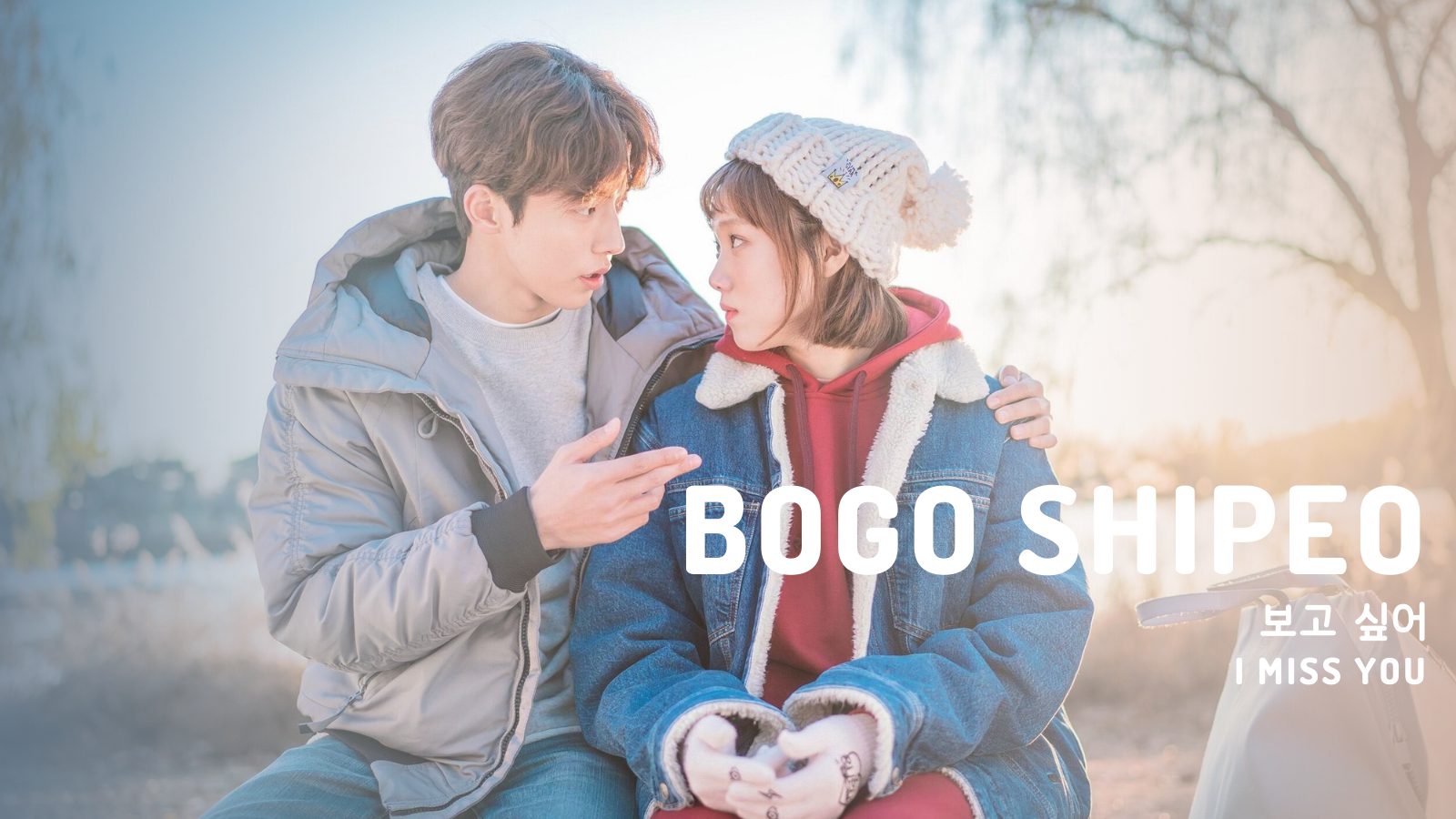
보고 싶어(요)
Bogo shipeo(yo)
I miss you
I miss you. If you ever miss someone but want to express it very subtly, text them this. Interestingly, the direct translation of this line is “I want to see you,” which certainly is equally sweet and romantic. In Weightlifting Fairy Kim Bok-Joo, you always hear Nam Joo-Hyuk’s character Joon-Hyung say this line to Lee Sung-Kyung’s character, Kim Bok-Joo.

안녕(하세요)
Annyeonghaseyo
Hello!
This is one of the most common Korean drama words used. If you want to be casual, annyeong is the way to go, but if you need to be a little more polite, use annyeonghaseyo to greet whoever you want to! Language learning starts when you become interested in knowing a few words and using them in your daily life. Then when your curiosity is piqued, you’ll want to learn the characters and build your sentences. So, greeting your peers annyeong is the first step to building your confidence in speaking and studying Korean.
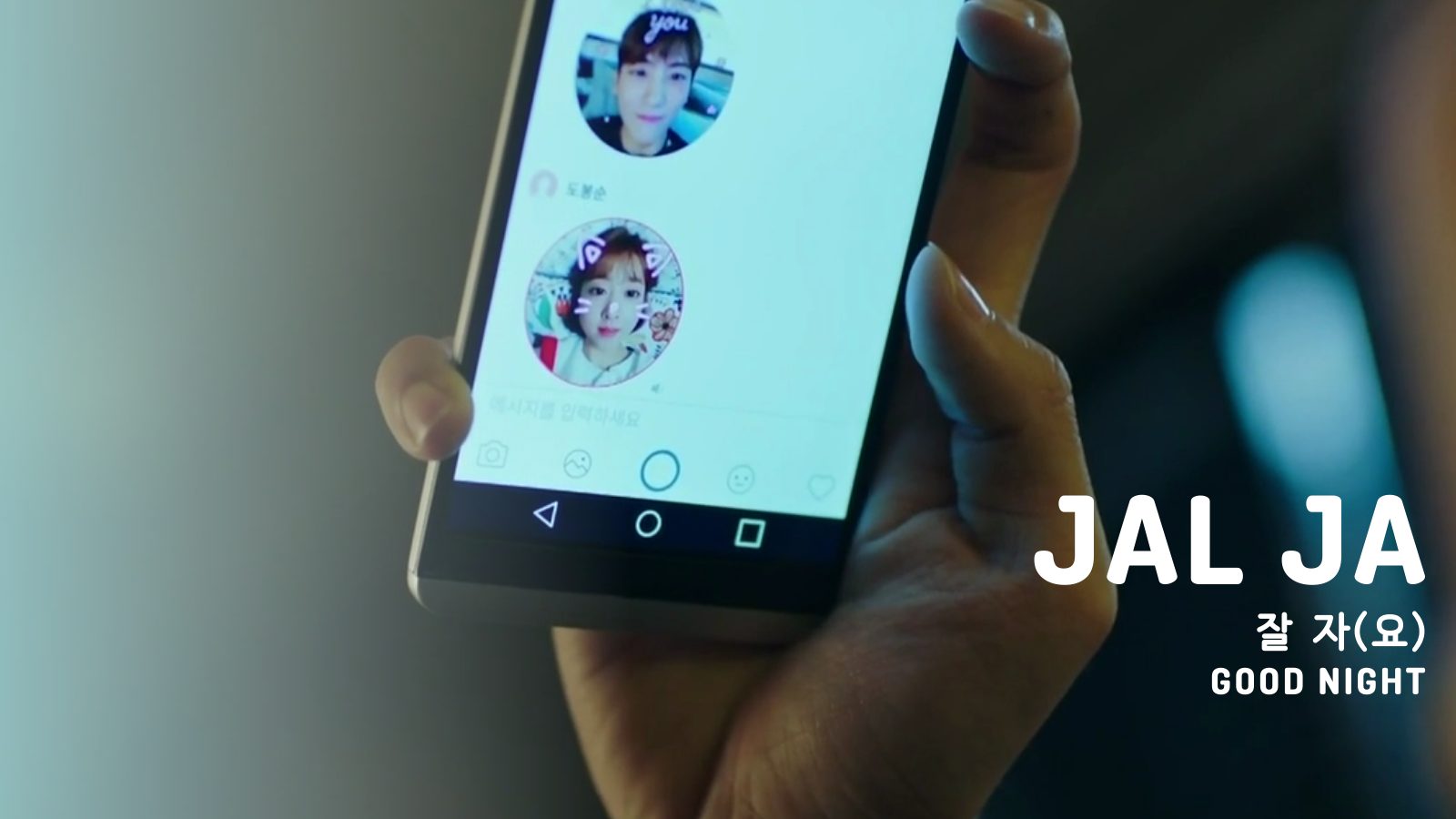
잘 자(요)
Jal Ja(yo)
Good night
Want to spice up the way you say good night? Say jal ja instead. It’ll definitely break the monotony. If you’ve watched Strong Woman Bong-Soon, then you’ll know the adorable scene where Bong-Soon sent him a video message saying “Jal jayo Minmin” which melted the hearts of many along with Ahn Min-Hyuk, Park Hyun-Shik’s character.

괜찮아(요)
Gwenchana(yo)
I’m okay
If someone asks if you’re alright, you can tell them gwaenchana, naneun gwaenchanayo. This is a common phrase whenever the main lead is in distress and the friends or other characters ask if they’re okay. During the iconic scene in Welcome to Waikiki, Lee Yi-Kyung’s character, Lee Joon-Ki bought a secondhand car after snagging a role in a drama. He keeps repeating Gwenchana gwenchana as his car slowly breaks apart. Needless to say, it was a hilarious scene.
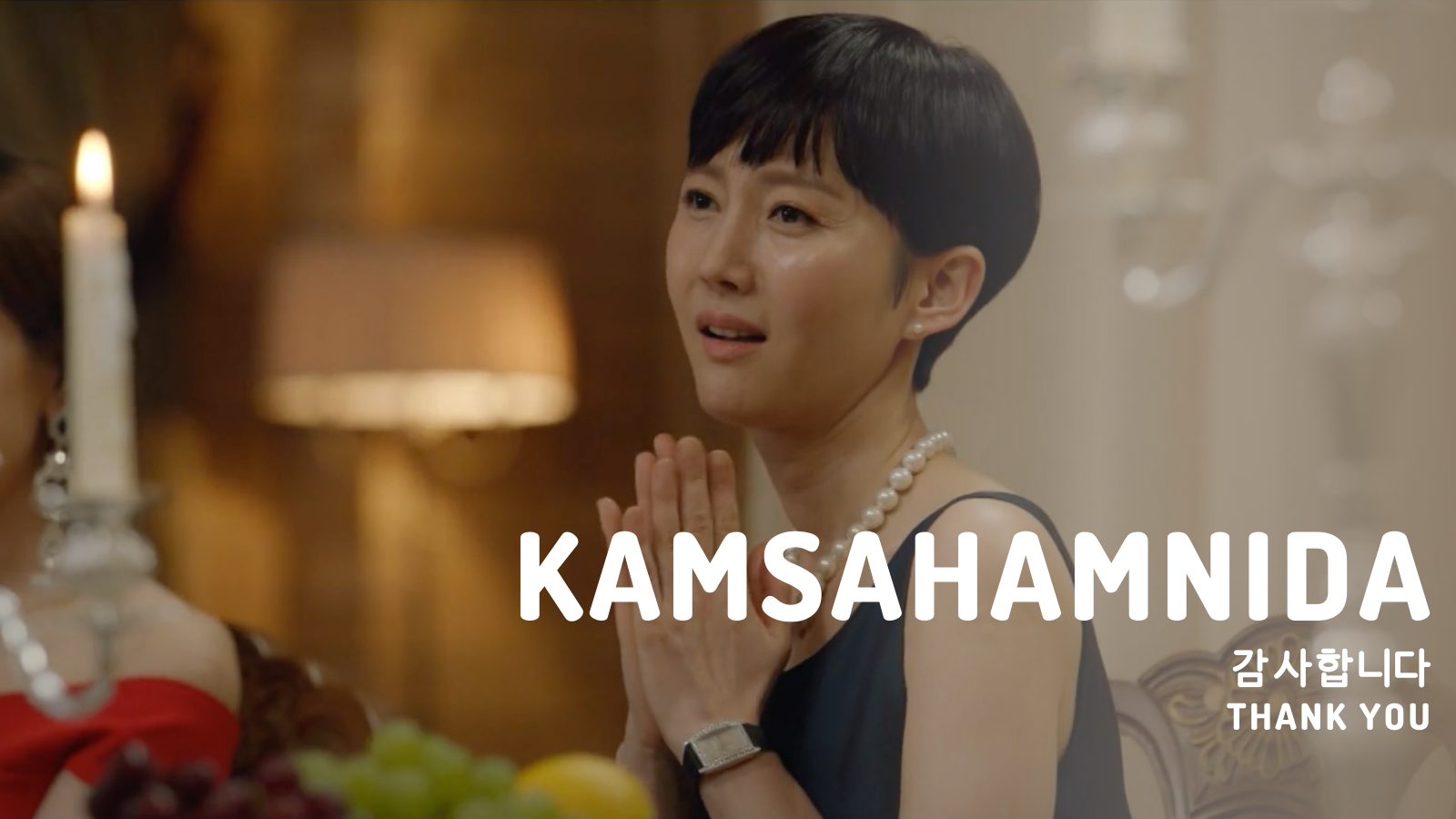
감사합니다
Kamsahamnida
Thank you
Whenever the situation calls for it, we always say thank you. This is easily one of the most important and first learned phrases when studying a language. Kamsahamnida is the formal way to say “thank you” in Korean. If you want a more casual one to use with friends, you can use gomawo or 고마워. Every single time you watch a Korean drama, whether it be the main character thanking a friend for their help or when purchasing an iced americano from a coffee shop, you’ll always hear this.

만화, 웹툰
Manhwa, webtoon
Korean comic
If you’ve seen W: Two Worlds Apart, then you’d know for sure what a manhwa or a webtoon is. Lee Jong-Suk’s character, Kang Cheol, is a webtoon character who crossed from his world to the real world. Originating in Korea, webtoon (웹툰) is colorized mobile and digital comics, an offshoot of the older Korean manhwa (the Korean term for comics, akin to manga of Japan). Today, there are many Korean webtoons translated to English. You’ll definitely enjoy reading manhwa and webtoon soon if you continue to learn more about the Korean language.
CCCI – Professional Korean Translation and Localization Services
Korean is a high-context language. So if you’re new to the language, it can be quite confusing. Here at CCC, we have experts who know the language like the back of their hands. CCC is a company that values quality and accurate multilingual translation. We can assure you that we will only provide the best Korean to English translations. Not only that, we also offer Korean translation services to other languages as well such as Korean to Japanese Translation, Korean to Tagalog Translation, Korean to Chinese Translation, and more.
CCC’s ten year-experience, along with covering over 30 languages worldwide, you don’t need to look for more. We cover translation and localization services ranging from manga and webtoon, games, business and documents, videos, and multilingual customer support in almost all industries. Create a new story with CCC.






